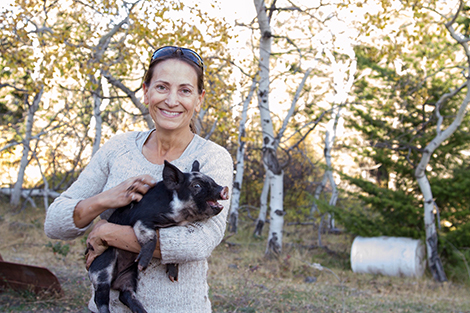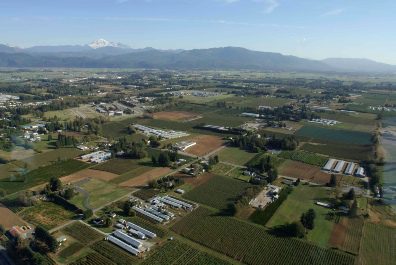MERRITT – Small scale abattoirs are closing across BC and that is an increasing concern for small-scale livestock and poultry farmers. The lack of processing capacity means more time spent travelling to the ones that remain. For Blue Sky Ranch, near Merritt, it means Kam Lakeview Meats near Kamloops and Rocana Meats in Salmon Arm. However, booking time is difficult.
“Last year, we had to sell a lot of our market hogs live because we can’t get them killed,” explains Blue Sky’s Julia Smith. “I’ve had to turn away quite a few potentially good corporate customers who would have taken regular shipments because I can’t rely on being able to process that many pigs.”
Smith says there’s no incentive for abattoirs to make accommodations for small-scale producers. The meat processing business and the regulations behind it ultimately end up not serving small-scale producers well.
“One of the accommodations they’ve made is that some farms will qualify for a Class D or E slaughter licence which allows you to slaughter on-farm,” she says. “But the limits imposed make it so that it’s impossible to earn a living from the number of animals you’re allowed to process.”
The licences don’t allow her to sell meat to commercial establishments or outside her regional district. She’s limited to selling directly to local customers which rules out farmers markets in Kelowna and Kamloops.
Smith adds that even if she could slaughter, she can’t butcher. Most people who have Class D and E licenses use them as a back-up when they can’t book into an abattoir. It happens more often than one would expect.
“There’s no motivation for most slaughter facilities to take us. We’re a pain in the ass. I’m bringing in a smaller number of pigs and what we’re seeing more and more is smaller producers being squeezed out because it’s not like any of these guys are making any large sums either, so for the amount of regulation and hassle they have to go through, why would they deal with small-scale producers,” she asks rhetorically.
Not one to sit back, Smith is working with other small-scale meat producers to see how they can resolve common issues. Ideally, she’d like a new industry association to advocate for small-scale meat producers and educate consumers.
“All of us crying out into the wilderness alone is obviously not working. We need somebody to be talking to Victoria. We’re all trying to operate these businesses within a framework that was set up for a completely different type and scale of business,” she says.
There’s a way to address public health and safety and still keep small farms in business, she believes, but individual producers can’t take on the challenges alone.
“We’re already working seven days a week,” she says matter-of-factly. “So you see more and more of us disappearing and going back to work off-farm. Most people I know have off-farm jobs and most people I know are subsidizing the cost of food so people who make more money than we do can buy it.”
For Smith, the value of small-scale agriculture goes beyond the price of a cut of meat.
“When you’re buying my pork, you’re not just buying a piece of meat. I have this hashtag, ‘meat you can feel good about.’ You’re buying peace of mind. You’re supporting small-scale farms – because one day we may not be able to get food from California, for example. We might be sorry we paved over our farms.”
Smith started the farm to change the world but her aspirations have shifted.
“I don’t think I’m going to make a big enough impact to really matter but I know we’ve influenced a good number of people and I sleep really well and I eat really well and I am living the dream by a lot of peoples’ standards,” she says. “I’m off the grid, in nature – it’s beautiful – and doing what I love. That’s worth something.”


 Producers need training for disaster response
Producers need training for disaster response